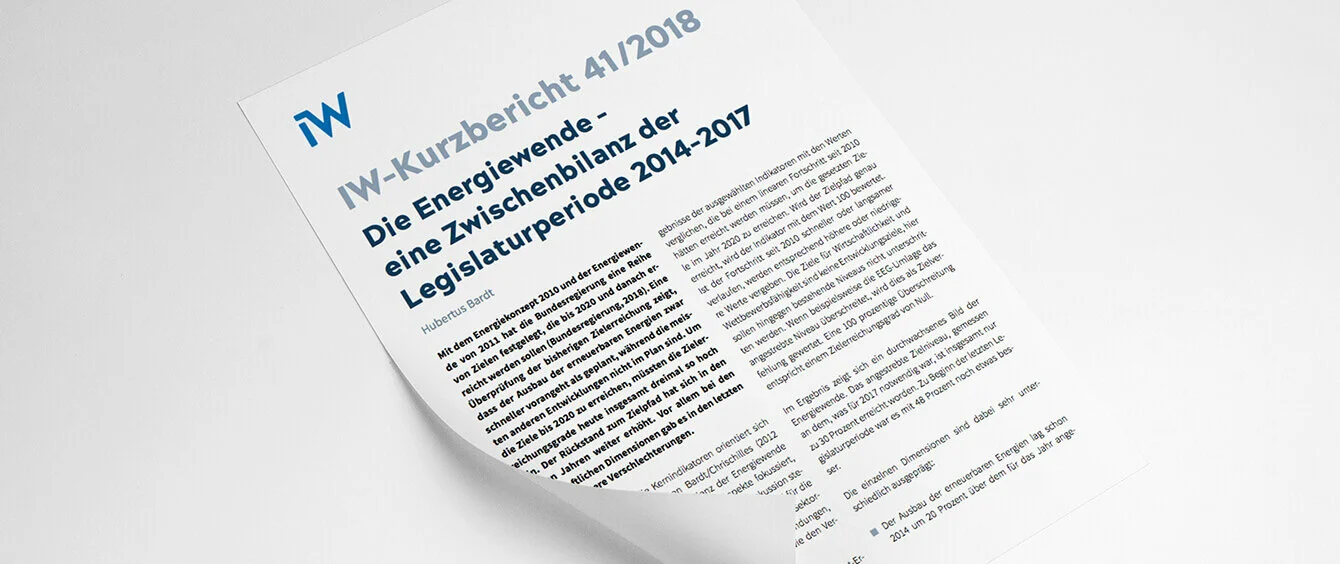The Cologne Institute for Economic Research (IW) conducted a study on the progress of the energy transition in Germany. The results show that the actual achievements are lagging farther and farther behind the roadmap for 2010 to 2020 set out by the government.
According to the Federal Network Agency, renewables were responsible for generating more than 100 billion kilowatt hours of electricity in the first six months of 2018 alone. That represents an increase of almost ten percent compared to the same period of last year. Never before had such a high figure been registered for a half-year. So, is the energy transition proceeding as planned? Unfortunately, this is clearly not the case in all areas, according to the Institute for Economic Research (IW). In the study ‘Interim Results of the Energy Transition’, the authors at the Cologne-based think tank find that the expansion of renewable energy is the only major part of the energy transition that is ahead of schedule. More specifically, it is 34 percent ahead of the plan.
In all other fields, there is major discord between the goals of the German government and reality: grid expansion, the reduction of greenhouse gas emissions and electricity consumption, profitability and competitiveness – progress in all of these areas has been much slower compared to the objectives formulated by the government for 2010 to 2011. And it actually appears that the pace of progress is slowing down.
Assessing the IW study in light of the newly formed Commission for ‘Growth, Structural Change and Employment’, the journalist Daniel Wetzel from the newspaper Welt finds the following: “A detailed review of the shortcomings shows that the biggest deficits in terms of the ecological restructuring of energy supply are not covered by the mandate of the recently created coal commission, either.”
In order to measure the degree of ‘goal achievement’, the IW authors assume linear progress from the status quo in 2010 to the objective for 2020 in relation to various indicators. Progress actually made in 2014 and 2017 was then compared to this roadmap.
The results are sobering: In 2017, the gap between all of the indicators reviewed and the target path was larger than in 2014. Looking at competitiveness for example, which is measured using the electricity price disadvantage for German industry compared to the European average: “In 2010, the additional costs for industrial enterprises of various sizes averaged 12 percent, whereas this figure was 25 percent in 2014 and as much as 30 percent in 2017.” The objective of the German government was to ensure that this difference did not increase any further above the 2010 level.
According to the summary by the Institute, the IW study concentrates on the progress in electricity generation, on the one hand because this aspect is a main point of focus in the public debate, and on the other hand because it is a “key factor for the energy transition as a whole”, in light of sector coupling, i.e. the electrification of transport and the heating and cooling of buildings.
The brief report of the IW ‘The Energy Transition – An Interim Statement on the 2014–2017 Legislative Period’ can be found here. The Welt article ‘Almost all of the goals for the energy transition targets have been missed so far’ by Daniel Wetzel can be found here.
Photo credits: © Cologne Institute for Economic Research (IW)
